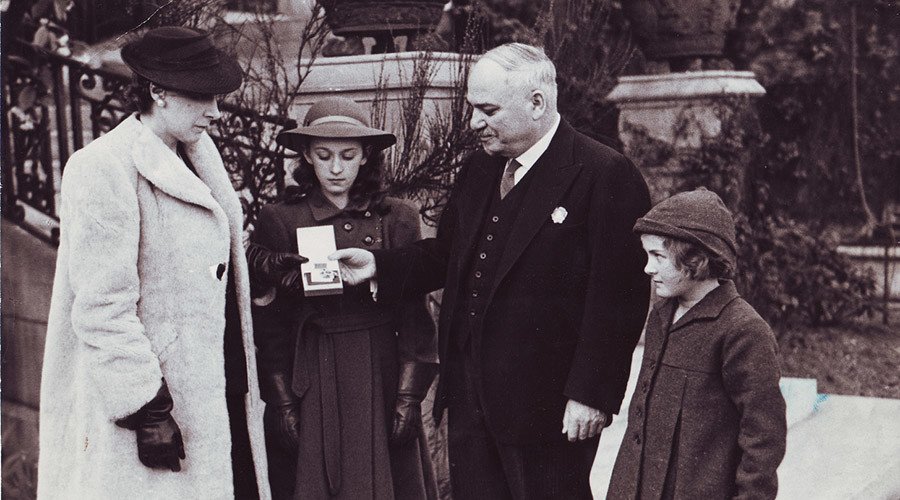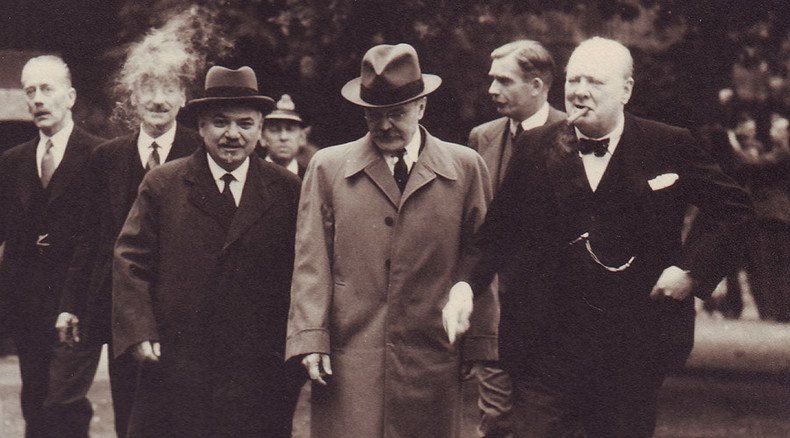With a new German offensive looming, the Soviet ambassador to the UK Ivan Maisky lobbied Britain to open a second front. In his diaries, published by historian Prof. Gabriel Gorodetsky, Maisky recalls debates with Sir Winston Churchill and Sir Anthony Eden.
The issue of a Second Front in Europe dominated relations between the Allies throughout the War. Churchill’s determination not to abandon his Middle Eastern Strategy led to promises, which were not met and a postponement of the cross channel operation from 1942 to 1944. The failure contributed to Maisky’s shaky standing in Moscow and combined with the miniature “cult of personality” which engulfed him in London, where he was identified with the Soviet sacrifices on the battle field, hastened his withdrawal from London in June 1943.
16 March 1942
On Saturday, the 14th, I received Comrade Stalin’s message to Churchill. I called the Foreign Office (FO) at once and asked for an appointment with the prime minister on Monday the 16th. Within an hour, the FO called to inform me that Churchill would see me on Monday at 5pm. Yesterday, Sunday, I received another call from the FO to inform me of a change of plan: the prime minister would not be able to see me at five o’clock on Monday and instead invited me to come to lunch at Chequers that same day. I agreed.
So today, at around one o’clock, I arrived at Chequers. Eden, whom I had asked to be present during my conversation with Churchill, appeared a few minutes later. Upon entering the room where I sat waiting, Eden took me aside and said anxiously: ‘I’ve just received a telegram from Washington that conveys the essence of Roosevelt’s statement to Litvinov... A very unpleasant statement. We must discuss it.’

That very moment the prime minister’s adjutant arrived and called us into the dining room. It was, in fact, not exactly a dining room, but a small corner room on the first floor with a very private feel to it. A small table was set for the three of us: Churchill, Eden and me. The Prime Minister, dressed in his habitual siren suit, greeted me in jovial, friendly fashion and apologized for his domestic appearance. Having undergone a minor operation today, he had been unable to return to the city and was obliged to receive me at home.
When we sat down at the table, I handed Churchill the message from [Comrade] Stalin. He quickly read it through and was evidently satisfied. … I drew Churchill’s attention to the paragraph where Comrade Stalin expresses his confidence that 1942 will be the decisive year. I asked Churchill: what were his thoughts on the subject?
Churchill’s countenance darkened immediately. He shrugged his shoulders and uttered with slight irritation: ‘I don’t see how 1942 can become the decisive year.’
I was about to protest, but Churchill cut me short with a sharp question: ‘Tell me, how do you feel yourselves to be today – stronger or weaker than in 1941?’
‘Stronger, of course,’ I answered without hesitation.
‘Well, I feel weaker,’ Churchill retorted.
And then he added by way of clarification: ‘Last year we had to fight against two major powers, this year – against three.’
‘But now,’ I responded, ‘you have two mighty allies.’
Churchill, however, would not agree with me and started raising additional domestic problems, such as India, the press, Parliament, production…
So then I decided to take the bull by the horns and said to Churchill: ‘I don’t know how you see it, but I think we face a very menacing situation. A crucial moment in the course of the war really is approaching. It’s “either or.” How do things stand? Germany is preparing an enormous offensive this spring. She is staking everything on this year. If we succeed in defeating the German offensive this spring, then in essence we will have won the war. The backbone of Hitler’s war machine would be broken this year. It would only remain for us to finish off the crazed beast. With Germany defeated, everything else would be relatively easy.
Now, suppose we fail to defeat Germany’s spring offensive. Suppose the Red Army is forced to retreat again, that we begin to lose territories once more, that the Germans break through to the Caucasus – what then? For Hitler will not stop in the Caucasus if that happens. He will go farther – to Iran, Turkey, Egypt, India. He will link hands with Japan somewhere in the Indian Ocean and stretch out his arms towards Africa. Germany’s problems with oil, raw materials and food will be resolved. The British Empire will collapse, while the USSR will lose exceptionally important territories. ... What would be our chances of victory?
And when?... That is the choice before us! It’s now or never!’
Churchill, who had been listening to me with a frowning countenance and his head bent to one side, suddenly straightened up with a jerk and exclaimed in great agitation: ‘We would rather die than reconcile ourselves to such a situation!’
Eden added: ‘I quite agree with the ambassador. The question is exactly that: now or never!’ +++… Churchill sat sunk in thought. Finally, he raised his head and said: ‘Perhaps you are right. All the information I have at my disposal testifies that the Germans are preparing an attack in the east. Countless trains are heading east, carrying men and weapons. ... Yes, you will have to withstand a terrible blow this spring. We must help you in every way possible. Do all we can.’
It was clear, however, that arriving at this conclusion had not been easy for Churchill.
Having thus gained victory over Churchill on this matter of principle, I shifted our conversation onto more practical ground. ...
There followed a long, animated, at times even heated, exchange of opinions. … Churchill said he was now studying the question of a second front in Europe. It was clear from this that Eden had already spoken with the PM on this matter, following my conversation with him on 12 March. I tried to develop the matter further and pushed the argument in favour of a second front which had worked so well on Eden (the need to train the British army in an attack-minded spirit).
Churchill responded to my argument no less positively than Eden. He even remarked that technically it would be easier to open a second front now, as compared to last year, because the English are currently in possession of a large number of vessels fit for landing operations. Nonetheless, the prime minister resolutely avoided making any specific promises.
... Churchill spoke about the Red Army with admiration, saying that goodwill towards the USSR had grown immensely in England, along with its prestige. He added with a laugh: ‘Just imagine! My own wife is completely Sovietized... All she ever talks about is the Soviet Red Cross, the Soviet army, and the wife of the Soviet ambassador, with whom she corresponds, speaks over the telephone and appears at demonstrations!’
He added with a sly sparkle in his eye: ‘Couldn’t you elect her to one of your Soviets? She surely deserves it.’
… During today’s conversation with the prime minister, I was struck by one feature, which I had not observed before: Churchill is in a ‘twilight mood’. He even let slip the remark: ‘I’m not long for this world… I’ll be ashes soon…’
The same note sounded in a number of other statements. But every time Germany was mentioned Churchill flared up and his eyes flashed with sparks of fury.
Translated by Oliver Ready and Tatiana Sorokina
Read more extracts from Gabriel Gorodetsky’s The Maisky Diaries, Red Ambassador to the Court of St James’s, 1932-1943.
The statements, views and opinions expressed in this column are solely those of the author and do not necessarily represent those of RT.


